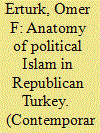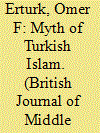|
|
|
Sort Order |
|
|
|
Items / Page
|
|
|
|
|
|
|
| Srl | Item |
| 1 |
ID:
188970


|
|
|
|
|
| Summary/Abstract |
The Milli Görüş political Islamic movement and the first political parties under its banner were founded and dominated by the Naqshbandis. Numerous scholars have so far suggested that political participation has led these groups to transform and moderate their former Islamist views over time. This study examines this possibility by scrutinising how Naqshbandi and Milli Görüş leadership perceive the state, essential political institutions such as the legislature, political parties, opposition, elections, and independent media, together with some defining issues in Islam such as jihad, excommunication, and al-wala’ wa-lbara’ (loyalty and disavowal). In particular, the study seeks to uncover how the Naqshbandi theological background has been turned into a political Islamist ideology through the influence of two important Naqshbandi shaykhs, Mehmed Zahid Kotku (1952–1980) and Mahmud Es’ad Coşan (1980–2001), and two leading Naqshbandi-affiliated Milli Görüş leaders Necmettin Erbakan and R. Tayyip Erdoğan to reveal if/to what extent Islamists’ participation in politics has transformed their Islamist views. As a methodology, content analysis and political discourse analysis have been used. The findings demonstrate a continuity of Islamist Naqshbandi thought in Milli Görüş leadership and that political participation has neither ‘democratised’ nor ‘moderated’ these parties and their radical Islamist thoughts.
|
|
|
|
|
|
|
|
|
|
|
|
|
|
|
|
| 2 |
ID:
184464


|
|
|
|
|
| Summary/Abstract |
Turkish Islam has been defined as unique and exceptional, and it is suggested that it is an antidote to radical Islamic ideologies due to its adherence to the supposedly moderate and rational Hanafi-Maturidi theology, which is considered to have an inclusive and tolerant Sufi character. Turkish Islam is mostly defined by its Gümüşhanevi lineage, the most successful, though not theologically heterogeneous, of all active Naqshbandi communities in Turkey. Sharing a belief in its non-revolutionary character, some have asserted that it is open to democratic values. This study delves into the concept of ‘Turkish Islam’ in the belief that there is a lack of in-depth textual and methodological analysis to assess these claims. Based on a text-based analysis of primary sources, particularly the works of Ahmed Ziyaeddin Gümüşhanevi and Mehmed Zahid Kotku, two leading masters of the Naqshbandi-Gümüşhanevi discipline, this study uncovers the foundational religious motivation and codes behind Turkish Islam. As a research methodology, content analysis with purposive sampling was conducted, focusing on six of the most defining issues of Islam, al-wala’ wal-bara’, apostasy, jihad, the Islamic state, women, and art and philosophy. The study concludes that Turkish Islam is not unique or even exceptional either at the theological and discursive levels, nor does it necessarily demonstrate a willingness to embrace the values attributed to it.
|
|
|
|
|
|
|
|
|
|
|
|
|
|
|
|
|
|
|
|
|